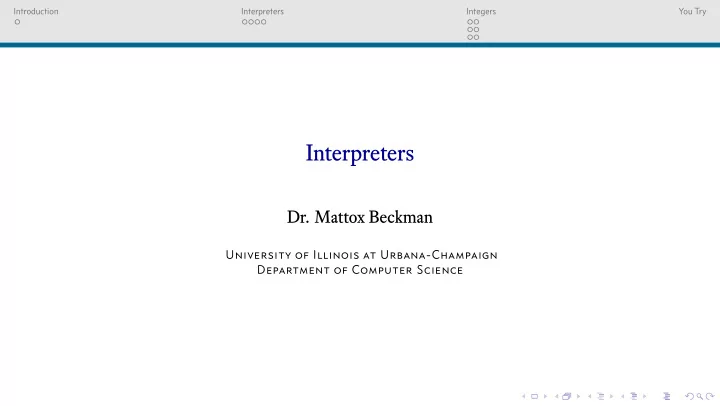

Introduction Interpreters Integers You Try Interpreters Dr. Mattox Beckman University of Illinois at Urbana-Champaign Department of Computer Science
Introduction Interpreters Integers You Try Objectives You should be able to … ◮ Enumerate and explain the different parts of an interpreter. ◮ Explain what an abstract syntax tree is. ◮ Explain the difference between an interpreter and a compiler. ◮ Explain what REPL means and what it does. ◮ Show how to defjne types in Haskell to represent expressions, values, and statements.
Introduction Interpreters Integers You Try What Is an Interpreter? ◮ There are two ways to execute code on a computer: ◮ Convert the code to machine code and run it directly. ◮ Have another program read the code and “do what it says.” ◮ The second method is what we will do in this course.
Introduction Interpreters Integers You Try Parts of an Interpreter ◮ The parser ◮ Converts your ASCII input into an abstract syntax tree ◮ The evaluator ◮ Processes the abstract syntax tree to yield a result ◮ A type to represent values ◮ A function to evaluate the expressions into values ( eval ), ◮ An environment to keep track of the values of variables ◮ A top-level function to tie all this together: the REPL ◮ Read ◮ Eval ◮ Print ◮ Loop
Introduction Interpreters Integers You Try Our Language Let’s write an interpreter for a simple functional language. We want the language to have: ◮ Integers ◮ Variables ◮ Arithmetic (+,-,*,/) ◮ Comparisons ( < , < = , > , > = , = , � = ) ◮ Booleans ( true , false , and , or , not ) ◮ Local variables ( let ) ◮ Conditionals ◮ Functions
|---- ... | |--- Parser.hs | |--- Types.hs | |--- Main.hs | |---- i2/ |--- Parser.hs | |--- Types.hs |--- Main.hs | |---- i1/ first/ Introduction Interpreters Integers You Try File Structure ◮ A reference version has been provided for you. ◮ stack build will compile them for you. ◮ stack exec i1 will run the fjrst interpreter. ◮ stack repl i1/Main.hs will load the interpreter but give you a Haskell prompt.
deriving ( Show , Eq ) deriving ( Show , Eq ) Introduction Interpreters Integers You Try Defjne the Types – Types.hs 1 data Exp = IntExp Integer 2 3 4 data Val = IntVal Integer 5 6 7 type Env = [( String , Val )]
eval :: Exp -> Env -> Val *Main Lib Parser Types> eval (IntExp 123) [] i1> quit IntVal 23 i1> 23 Welcome to your interpreter! *Main Lib Parser Types> main % stack repl i1/Main.hs *Main Lib Parser Types> :t eval IntVal 123 Introduction Interpreters Integers You Try Eval – I1.hs 1 eval :: Exp -> Env -> Val 2 eval ( IntExp i) _ = IntVal i ◮ Or use stack exec i1 to run it directly.
IntExp 5 | ... IntExp 4 IntOpExp "*" IntExp 3 IntOpExp "+" ( IntOpExp "*" ( IntExp 4) ( IntExp 5)) Introduction Interpreters Integers You Try Adding Arithmetic and Abstract Syntax Trees ◮ Add the following to the Exp type. 1 data Exp = IntOpExp String Exp Exp 2 ◮ Represent 3 + 4 * 5 with Haskell code. 1 IntOpExp "+" ( IntExp 3) 2 ◮ Note that this is a tree!
v2 = eval e2 env v2 = eval e2 env in IntVal (getInt v1 - getInt v2) in IntVal (getInt v1 * getInt v2) = 0 v2 = eval e2 env let v1 = eval e1 env let v1 = eval e1 env let v1 = eval e1 env Introduction Interpreters Integers You Try Eval – i2.hs 1 eval ( IntOpExp "+" e1 e2) env = 2 3 4 in IntVal (getInt v1 + getInt v2) 5 eval ( IntOpExp "*" e1 e2) env = 6 7 8 9 eval ( IntOpExp "-" e1 e2) env = 10 11 12 13 getInt ( IntVal i) = i 14 getInt _ This is working for the computer !
IntVal 200 , ("-",( - )) Main> liftIntOp (*) (IntVal 10) (IntVal 20) = IntVal 0 _ , ("/",div)] , ("*",( * )) Introduction Interpreters Integers You Try Making a Dictionary 1 intOps = [ ("+",( + )) 2 3 4 5 6 liftIntOp f ( IntVal i1) ( IntVal i2) = IntVal (f i1 i2) 7 liftIntOp f _ The compiler will give you a warning about liftIntOp .
in liftIntOp f v1 v2 200 Just f = lookup op intOps v2 = eval e2 env let v1 = eval e1 env Main> let Just f = lookup "*" intOps Main> f 10 20 Introduction Interpreters Integers You Try Our New Eval – I2 1 eval ( IntOpExp op e1 e2) env = 2 3 4 5
Introduction Interpreters Integers You Try You try! ◮ The interpreter i3 is a copy of i2 with some extra constructors added: ◮ RelOpExp – for integer comparisons like ≥ ◮ BoolOpExp – for && and || ◮ BoolExp – for True and False ◮ BoolVal – the corresponding value ◮ The parser has also been updated to return these expressions. ◮ See if you can update eval to work with these new things. ◮ The next video will go over the solutions, plus show you how to add variables to the language. (Or you can peek at i4 …)
Recommend
More recommend